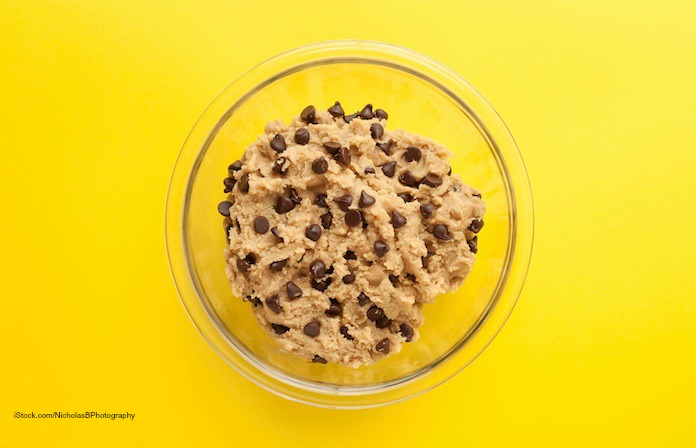The FDA blog is focusing on raw dough today. The government is warning consumers that eating raw dough is risky and could give you food poisoning.
While most people think that part of making cookies and cake is eating the raw dough or batter, you could get sick. Kids are especially vulnerable to serious complications from food poisoning, including kidney failure and death.
The E. coli O121 outbreak linked to General Mills flour is a case in point. Flour is a raw agricultural product that can harbor pathogenic bacteria. Heat is the only thing that will kill those bacteria. A government investigation found that raw dough eaten or handled by some of those sickened was made with General Mills flour produced in their Kansas City, Missouri facility. Bacteria in a flour sample was linked to bacteria from people who were sickened.

General Mills recalled 10,000,000 pounds of flour sold under the Gold Medal, Signature Kitchen’s, and Gold Medal Wondra brand names. Since flour has such a long shelf life, check your kitchen to see if you have any of these recalled products. If you do, or if you decanted the flour into another container and no longer have the label, throw it away.
Play dough made with raw flour is also not safe. Don’t give your kids raw dough or baking mixes that contain flour to play with. Some of the recalled flours were sold to restaurants that let children play with dough made from the product while waiting for their meals. The CDC is advising restaurants not to give their customers raw dough. And day care or kindergarten classrooms should not make or use “play” clay made from raw dough.
The usual reasons people are told not to eat raw cookie dough is because of the problem of raw eggs. But flour is not a product usually associated with food poisoning outbreaks.
Dr. Leslie Smooth, a senior advisor in FDA’s Office of Food Safety and a specialist in the microbiological safety of processed foods said, “flour is derived from a grain taht comes directly from the field and typically is not treated to kill bacteria.” So if an animal heeds the call of nature in the field, bacteria from animal waste could contaminate the grain.
Common “kill steps” used during food processing or preparation include boiling, baking, roasting, microwaving, and frying. With raw dough, there is no kill step.
The symptoms of an E. coli infection include abdominal pains, mild fever, and diarrhea that may be bloody and/or watery. Some people, especially children under the age of five, can develop a serious complication from this infection called hemolytic uremic syndrome (HUS). This complication can cause kidney failure and death. The symptoms of HUS include little or no urine output, lethargy, skin rash, jaundice, and bleeding from the nose or mouth. If anyone is experiencing these symptoms, they should be taken to a doctor immediately.
To keep you and your family safe, do not eat raw cookie dough, cake mix, batter, or any other product that is supposed to be cooked or baked. Follow package directions for cooking flour products at safe temperatures for specified times. Wash your hands, work surfaces, and utensils well with soap and water after contact with flour and raw dough products. And follow label directions to chill raw dough products immediately after purchase until they are baked.




